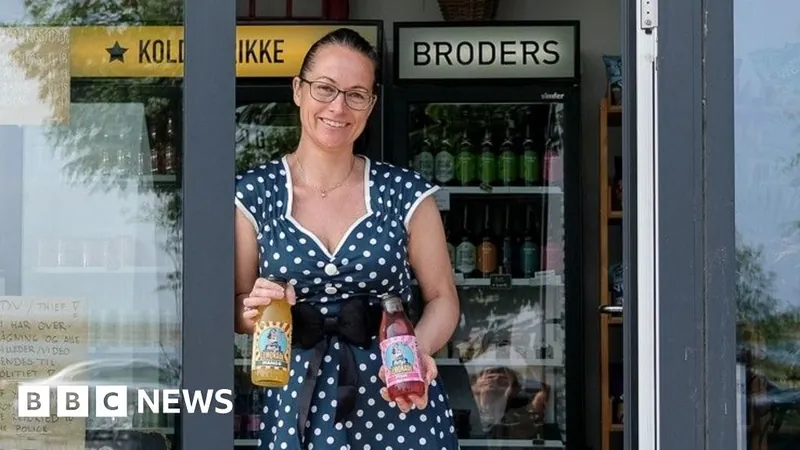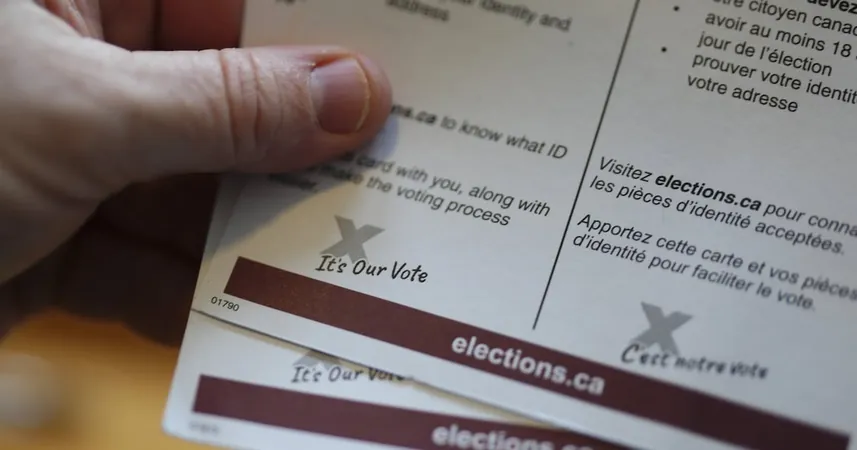
Canadians and Danes Take a Stand: The Boycott of American Products Gains Momentum
2025-04-08
Author: Liam
The Rise of Boycotts Against American Products
In a movement echoing across Canada and parts of Europe, a rising tide of consumers is boycotting American products in response to U.S. tariffs and political tensions, particularly under the Trump administration. This sentiment has resonated deeply with individuals like Todd Brayman, a Canadian Armed Forces veteran from Nova Scotia. For Brayman, abandoning his favorite California red wine symbolizes a broader commitment to supporting local businesses.
"Having served alongside American forces, it's disheartening to see how our historical bonds are being strained," Brayman expressed. "We need to stand up for our Canadian products."
The shift hasn’t been easy. Brayman and his wife have explored local alternatives, ultimately replacing imported goods with Canadian-made options. With the help of a smartphone app called Maple Scan, which identifies product origins via barcode scanning, they have streamlined their purchasing decisions. This app, launched just a month ago, has already surpassed 100,000 downloads, showcasing the growing interest in prioritizing local purchases.
Sasha Ivanov, the founder of Maple Scan, believes this movement endorses a new way of thinking among Canadians. "Many have stated they are committed to supporting local businesses—there’s no turning back," he noted.
Economic Backlash: Tariffs and Counter-Tariffs
The call for a boycott stems from substantial tariffs introduced by the Trump administration, which include 25% on foreign cars, steel, and aluminum—ultimately fueling a response in Ottawa with a staggering C$60 billion in counter-tariffs. This backlash has led to a notable decline in Canadian tourism to the U.S., as more people seek to redirect their spending towards homegrown products.
European Echoes: Denmark Joins the Boycott
Across the Atlantic, Denmark has seen similar sentiments. The country’s largest grocery operator, Salling Group, now prominently marks European products with a black star, aiding consumers in their quest for local alternatives. The motivations for this grassroots movement are just as emotional as they are financial, as exemplified by Bo Albertus, a school principal in Copenhagen. Frustrated by Trump’s remarks about acquiring Greenland, he decided to cancel his subscriptions to American streaming services like Netflix and Disney Plus. "I can’t change America's political system, but I can vote with my credit card," he asserted.
A Facebook group focused on boycotting American goods has amassed 90,000 members, where Danish consumers share tips for substituting various products—revealing the extent to which this boycott has penetrated societal consciousness.
Local Businesses Respond to Changing Consumer Preferences
Mette Heerulff Christiansen, owner of Broders grocery in Copenhagen, has actively removed American products from her shelves, replacing them with European options whenever possible. "Coca-Cola is easy to swap out for Jolly Cola, but avoiding tech like Facebook proves to be a challenge," she commented.
Many economists, however, cast skepticism over how long-lasting or impactful such boycotts can be. Douglas Irwin, a professor at Dartmouth College, noted, "Consumer boycotts typically begin as a reaction but often lose steam over time." Nevertheless, the surge in "Buy Canadian" sentiment is undeniably benefitting local brands, prompting significant sales increases across various sectors.
Impact on American Businesses and the Broader Economy
In Canada, initiatives promoting locally-made products, such as the "Made in Alberta" campaign, have seen a spike in interest. Bianca Parsons, the initiative's director, reported an impressive 20,000 site hits every two weeks since such tariffs were implemented.
American businesses are feeling the pinch too. Caledonia Spirits, a distillery based in Vermont, saw a significant order to Quebec canceled due to the tariffs. President Ryan Christiansen commented on the heated climate, stating, "Everyone seems to be reacting aggressively, and it's unfortunate that America started this."
Amid these complicated dynamics, Ethan Frisch, co-founder of the New York-based Burlap & Barrel, expressed concern over how rising inflation and tariffs are affecting business, indicating that the underlying economic factors may be more critical than consumer boycotts.
Conclusion: The Future of Consumer Boycotts
As this cross-continental movement persists, one thing is clear: consumers are wielding their purchasing power as a means of protest, driving a transformation in their shopping habits that emphasizes local products and solidarity against perceived injustices. The true impact of this boycott remains to be seen, but its implications are echoing loudly in both the U.S. and abroad.









 Brasil (PT)
Brasil (PT)
 Canada (EN)
Canada (EN)
 Chile (ES)
Chile (ES)
 Česko (CS)
Česko (CS)
 대한민국 (KO)
대한민국 (KO)
 España (ES)
España (ES)
 France (FR)
France (FR)
 Hong Kong (EN)
Hong Kong (EN)
 Italia (IT)
Italia (IT)
 日本 (JA)
日本 (JA)
 Magyarország (HU)
Magyarország (HU)
 Norge (NO)
Norge (NO)
 Polska (PL)
Polska (PL)
 Schweiz (DE)
Schweiz (DE)
 Singapore (EN)
Singapore (EN)
 Sverige (SV)
Sverige (SV)
 Suomi (FI)
Suomi (FI)
 Türkiye (TR)
Türkiye (TR)
 الإمارات العربية المتحدة (AR)
الإمارات العربية المتحدة (AR)